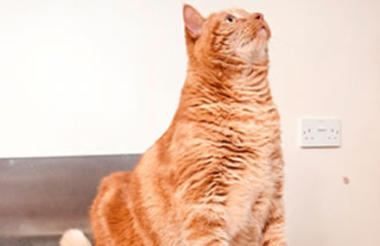Merry weekend one and all! It is Friday lunchtime, which can only mean it is time for Society Diary to regale you, dear reader, with this week's highlights from the charity universe.
Weigh in time at Pet Fit Club
Firstly, one of Diary’s favourite charity projects – PDSA’s Pet Fit Club. In case you’ve not been following closely, each year the animal charity seeks out some of the country’s podgiest pets to take part in its weightloss challenge.
Well, PDSA has just opened applications for this year’s competition and to motivate then nation’s rotund animals (and their owners) shared an inspirational video showing the difference healthy eating and a bit of exercise can make.
It has also compiled this list of “Ten weirdest foods eaten by pets”, and reader Diary has gone deep into this list – for some of these household chums had some incredibly British food habits.
Zorro the cat was addicted to cheese and onion crisps, Merlin the dog to digestive biscuits (unclear if these or were not dunked in tea), Bruce the boxer to Weetabix with goat’s milk and honey and Skippy the springer spaniel to a full Sunday Roast.
But Diary’s winner by far is Daisy the bulldog who was partial to cheese and broccoli. Now in Diary’s opinion the only way to eat broccoli is to cover it in a substantial layer to mature cheddar, so particularly feel sfor poor Daisy having to give this up.
On a serious note, PDSA says it’s concerned about increases in animal obesity and one of its vets, Olivia Anderson-Nathan, explains that basically the only way to curb the animal epidemic is to stop feeding animals human food.
“Pets don’t need human food, in fact a lot of it can be very bad for them. They should be fed a complete pet food suitable for their age and weight, with occasional healthy treats. Our pets also need regular, varied exercise, suitable for their health and to keep their minds stimulated.
“A much healthier way to spoil a pet is to spend time with them, like taking them for an extra walk, buying them a new toy or giving them more playtime.”
Radical.
Don’t drink and donate
Telegraph readers, eh? What a species. Diary has cultivated a new addiction in 2019 to the newspaper’s Moral Money section. For those who haven’t come across it, each week the page is home to a real-life tale from different Telegraph reader, in which their greed and altruism come head-to-head.
Last week’s anecdote was shared by RD from Nottingham who donated a couple of thousand pounds to charity at Christmas after getting “rather too merry” and now, a month later, wants it back. Diary did briefly consider that this story was a great argument for the importance of rich people drinking alcohol. However, RD says the reason for his drunken donation was not due to being overcome by a Christmas Carol-like sense of goodwill, but because he was trying “to show off to my friends”.
RD charmingly compared the “not a large charity” to his niece by saying: “If I accidentally gave my niece a gift card for £250 instead of £25, she wouldn't make me honour it.” It must be reassuring to the charity to know that RD holds members of his own family with equal contempt.
Diary recommends that the charity plays to RD’s clearly fragile ego by encouraging his friends to say how impressed they are will his generous donation. If that doesn’t embarrass him enough, perhaps the charity could thank RD for the donation and ask him to pose with a giant cheque for coverage in the local newspaper, or maybe put a plaque on the wall of its building, “The RD Suite”.
As fellow Telegraph reader Gudieve Ning commented, the moral of the story is “don’t drink and donate”.
The life of a Charity Commission worker
This week the Guardian offered a rare insight into how those on the other side of the regulatory fence live when it published the diary of a Charity Commission worker.
John Lewis, a registration case manager for the regulator, details a rollercoaster week in which he accepted an application from a prospective charity, rejects a lobbying organisation (with regret) and rejects a commercial organisation (with less regret). His prose is filled with narrative flourishes such as a masterful use of pathetic fallacy when he writes “the sun is shining as I hit send” on the accepted application.
Diary is particularly impressed by Lewis’s dedication to his role, which is so robust that his working week does not even end on Friday. At breakfast the next morning, he reads about a high-profile individual’s plans for a new charity. He writes: “As I make tea, I ponder the possible complexities of the application that will inevitably come to us. I hope for their sake it meets the test.”
However, Lewis’s attitude does not appear to be shared by his colleagues. As he says: “I tell all new colleagues they are becoming guardians of the integrity of the charity register, upon which public trust and confidence in charity is built. That is met with some rolled eyes – fair. However, I would never want my family or friends to give their support to an organisation that couldn’t be verified or held to account.” Diary is disappointed by the attitude of his eye-rolling colleagues but is confident that Lewis is the man to lick those smart-arse layabouts into shape.
Related articles












